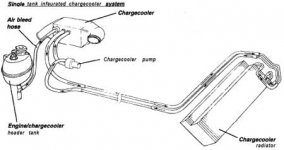I watched a video yesterday about spraying the intercooler with water to reduce the temperature of the air before it enters the engine.
A gain of a few horse power is supposedly the result. A bit like the extra umph we all feel on a cold morning.
Has anyone actually tried this on a road car?
I have an old water pump from our caravan that produces about 40psi and because I have nothing better to do I thought I might test the theory and try making a simple water misting kit for my intercooler to see if it actually does make a difference. Activated by myself 10 seconds before I plant my foot on the accelerator it should cool the intercooler sufficiantly to make a difference.
So is it worth my time and effort or will I acheive nothing more than a wet intercooler?
A gain of a few horse power is supposedly the result. A bit like the extra umph we all feel on a cold morning.
Has anyone actually tried this on a road car?
I have an old water pump from our caravan that produces about 40psi and because I have nothing better to do I thought I might test the theory and try making a simple water misting kit for my intercooler to see if it actually does make a difference. Activated by myself 10 seconds before I plant my foot on the accelerator it should cool the intercooler sufficiantly to make a difference.
So is it worth my time and effort or will I acheive nothing more than a wet intercooler?



